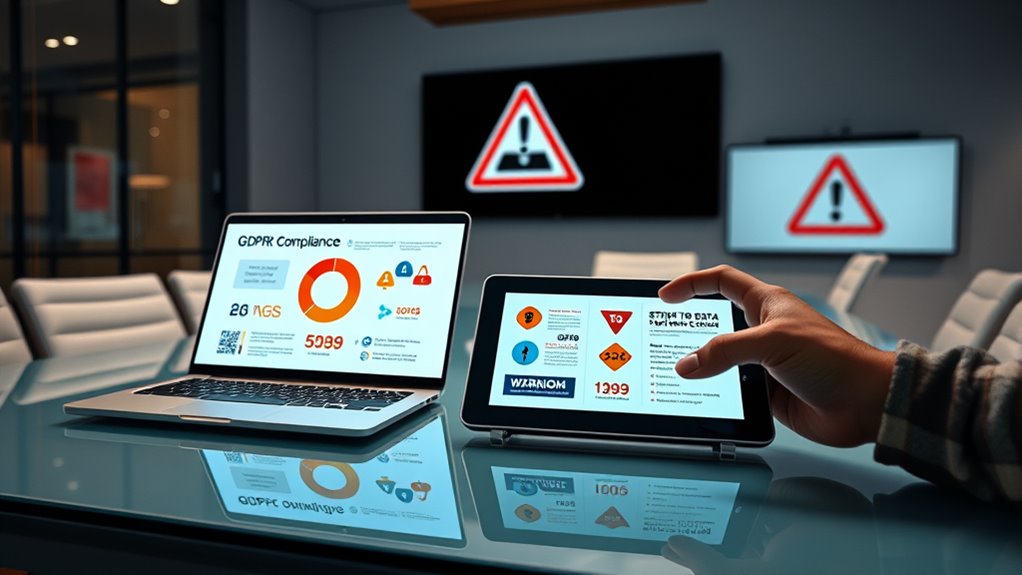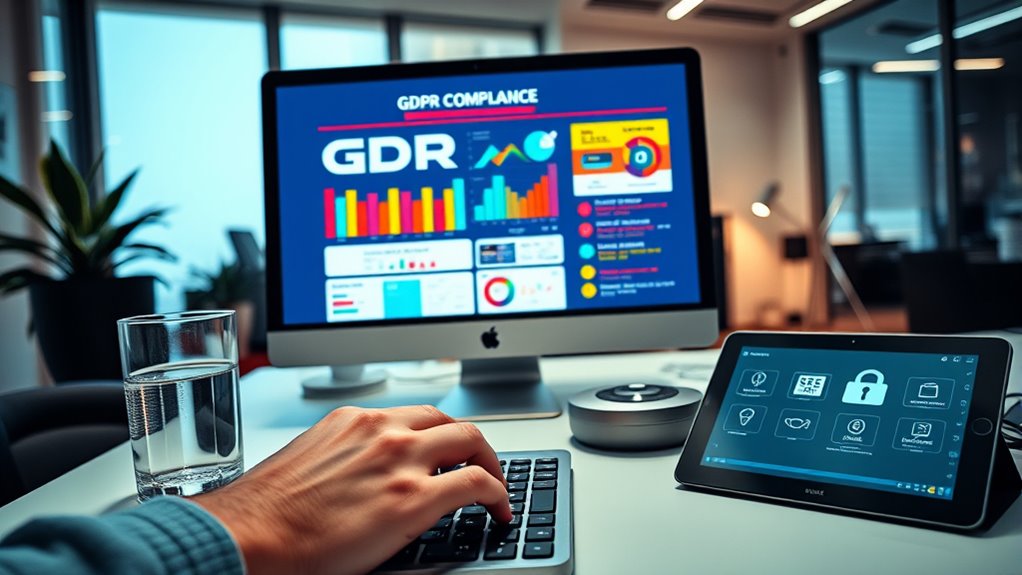GDPR is a law from the European Union designed to give you better control over your personal data. It requires companies to be transparent about how they collect, use, and protect your information, and it grants you rights like accessing, correcting, or deleting your data. If organizations don’t follow these rules, they can face hefty fines. Staying informed about these protections helps you manage your privacy better; explore further to understand your rights fully.
Key Takeaways
- GDPR enhances user control over personal data, allowing access, correction, deletion, and data portability rights.
- It requires companies to obtain clear, informed consent before collecting or processing user data.
- Users must be informed about how their data is used through transparent privacy policies.
- GDPR mandates prompt breach notifications, helping users protect themselves from identity theft and fraud.
- It enforces penalties on organizations that fail to comply, increasing accountability and data security.
What Is GDPR and Why Was It Created?

The General Data Protection Regulation (GDPR) is an all-encompassing data privacy law enacted by the European Union to give individuals more control over their personal information. It was created in response to increasing concerns about data breaches and privacy breaches that expose sensitive data. When companies mishandle your data, it can lead to identity theft, financial loss, or reputational harm. GDPR aims to prevent these issues by setting strict rules for how organizations collect, store, and process your data. It also requires companies to notify you promptly if a privacy breach occurs, so you can take necessary actions. Ultimately, GDPR was designed to strengthen your rights and ensure that your personal information is protected against misuse and unauthorized access. Implementing data organization strategies can help organizations comply with these regulations more effectively.
Key Principles Behind GDPR Regulations

GDPR is built on core principles that safeguard your data rights, requiring organizations to respect your privacy. They must obtain your clear consent before collecting or processing your information and be transparent about how they use it. These standards ensure you’re always informed and in control of your personal data. Emphasizing data accuracy helps ensure that the information collected remains correct and up-to-date, further protecting your privacy and rights under GDPR.
Data Privacy Rights
Have you ever wondered what your rights are when it comes to your personal data? Under GDPR, you have several important rights to protect your privacy. You can access your data, ask for corrections, or request its deletion. You also have the right to restrict or object to how your data is processed. GDPR emphasizes the importance of data encryption to safeguard your information and mandates breach notification, so you’re informed promptly if your data is compromised. These rights give you control over your personal data and ensure companies handle it responsibly. Knowing these rights helps you hold organizations accountable and make informed decisions about your privacy. Additionally, privacy policies are designed to inform you about how your data is collected and used. Remember, GDPR aims to put you in charge of your data, fostering trust and transparency.
Consent Requirements
Consent is a fundamental principle that underpins GDPR regulations, guaranteeing that your personal data is processed only with your clear and informed agreement. When you visit a website, you’ll often see cookie banners asking for your consent, especially for things like third-party tracking. These banners are designed to give you control over what data is collected and how it’s used. GDPR requires that consent be specific, informed, and freely given, meaning you must understand what you’re agreeing to before taking action. You shouldn’t be pressured into accepting cookies or third-party tracking; instead, options should be clear and easy to manage. This approach empowers you to decide what personal information you share and ensures companies respect your privacy rights. Additionally, clear data processing practices help build trust between users and organizations.
Transparency Standards
Transparency is a core principle of GDPR that guarantees you know how your personal data is collected, used, and shared. This is achieved through clear digital transparency and thorough privacy disclosures. Organizations must openly communicate their data practices, making it easy for you to understand what information they gather and why. They’re required to provide easily accessible privacy notices that detail processing activities, helping you make informed choices. Transparency standards also mean that any changes to data handling are promptly disclosed. This ensures you’re always aware of your rights and how your data is managed. By prioritizing transparency, GDPR empowers you to exercise control over your personal information and hold organizations accountable for responsible data practices. Additionally, the use of AI security technologies enhances the accuracy and efficiency of monitoring compliance and detecting potential breaches, further supporting transparency efforts.
How GDPR Affects Your Privacy Rights

GDPR gives you the right to access your data whenever you want, making it easier to see what information companies hold about you. You also have more control over how your data is used and shared, so you can decide what stays private. These changes put you in the driver’s seat when it comes to your privacy. Understanding tableware and its cultural significance can also help you better appreciate the diverse ways personal and social identities are expressed through everyday items.
Data Access Rights
Have you ever wondered what personal data companies hold about you and how easily you can access it? Under GDPR, you have the right to request access to your data, known as user access. This means companies must provide a clear, understandable copy of the information they store about you. You can also ask for details on how your data is used and who it’s shared with. Additionally, GDPR grants you data portability, allowing you to transfer your data from one service provider to another seamlessly. These rights empower you to take control of your personal information, promoting transparency and trust. Furthermore, understanding the types of data companies collect can help you better exercise your rights. If you want to exercise these rights, organizations are legally obligated to respond within a set timeframe, ensuring you stay informed about your data.
Enhanced Data Control
Ever wondered how your privacy rights are strengthened under GDPR? It’s all about enhanced data control, giving you more power over your personal information. You can request your data in a portable format, making it easier to transfer between services—this is data portability in action. GDPR also emphasizes user empowerment, meaning you have the right to access, correct, or delete your data whenever you want. Companies are now required to be transparent about how they handle your information, giving you clearer control. These measures ensure you’re not just a passive data subject but an active participant in managing your privacy. With GDPR, your ability to regulate your data is stronger than ever, helping you protect your personal information more effectively. Additionally, understanding floating on water can help you better appreciate the importance of staying afloat with your privacy rights.
Your Rights as a Data Subject Under GDPR

As a data subject, you are granted specific rights that give you control over your personal information. You have the right to access your data, so you can see what companies hold about you. If you want to move your data elsewhere, you can exercise your right to data portability, ensuring your information is transferable in a structured, commonly used format. If you no longer want a company to use your data, you can invoke your right to be forgotten, requesting its deletion. These rights empower you to manage your personal information actively and protect your privacy. Understanding these rights helps you take charge of your data, ensuring companies handle it responsibly and transparently. Additionally, personality assessments like the 16PF can help individuals better understand their traits, which can influence how they approach data privacy and personal boundaries.
How Companies Must Comply With GDPR

To comply with GDPR, companies must implement clear policies that prioritize data protection and transparency. Corporate compliance begins with establishing robust data management practices, ensuring personal data is collected, processed, and stored securely. You need to document your data handling procedures and inform users about how their information is used. Regular training for staff on GDPR requirements is essential to maintain compliance. You should also appoint a data protection officer if necessary, to oversee privacy efforts. Implementing data minimization—collecting only what’s necessary—and enabling users to access or delete their data helps meet GDPR standards. By maintaining transparent communication and adhering to these principles, you ensure your organization stays compliant and respects user privacy. Additionally, integrating sustainable practices into data management can further enhance your organization’s commitment to ethical standards.
The Penalties for Non-Compliance

Failing to comply with GDPR can lead to severe financial and reputational consequences for your organization. Authorities impose hefty fines and sanctions on companies that breach data protection rules, which can reach up to 20 million euros or 4% of your annual turnover. These penalties are designed to deter non-compliance and emphasize accountability. The process of achieving full compliance often presents challenges, especially for organizations unfamiliar with GDPR requirements. If you ignore these compliance challenges, you risk not only hefty fines but also lasting damage to your reputation. Non-compliance can erode customer trust and lead to legal action. Consequently, understanding these penalties underscores the importance of prioritizing data protection and ensuring your organization adheres to GDPR standards.
Practical Steps to Protect Your Data Online

Protecting your data online requires proactive and practical steps to minimize risks and stay compliant with regulations like GDPR. First, verify your accounts use strong, unique passwords and enable two-factor authentication whenever possible. Regularly review privacy policies on websites and apps to understand how your data is collected and used. Implement data encryption on your devices and during data transmission to protect sensitive information from unauthorized access. Be cautious when sharing personal details and limit the amount of data you provide online. Keep your software and security systems up to date to patch vulnerabilities. By taking these steps, you actively reduce your digital footprint and better safeguard your personal information against cyber threats and non-compliance penalties.
Future Trends and Evolving Data Privacy Laws

As digital privacy continues to gain prominence, laws and regulations around data protection are expected to evolve rapidly. You’ll see increased focus on AI regulation, ensuring algorithms respect user rights and transparency. Governments are also tightening rules around cross border data flows, making data transfer more secure and compliant with local laws. Future laws will likely emphasize stricter data minimization, user consent, and accountability for organizations handling your information. As organizations adapt to these changes, you’ll notice more clarity around your rights and stronger enforcement measures. Staying informed about these evolving laws helps you better navigate your online privacy. Overall, the trend points toward more exhaustive protections, giving you greater control over how your data is shared and used across borders and AI systems.
Frequently Asked Questions
How Can I Exercise My Right to Data Portability Under GDPR?
To exercise your right to data portability under GDPR, you need to request a copy of your data in a structured, commonly used data format, like CSV or JSON, for easy data transfer. Contact the data controller and specify that you want your data transferred directly to another service provider if possible. Keep your request clear, and they must respond within a month, providing your data in a portable, usable format.
What Are the Common Challenges Companies Face When Implementing GDPR?
Steering GDPR’s maze feels like threading a needle in a storm. Companies often wrestle with challenges like employee training, which is crucial to foster compliance, and data mapping, essential for understanding where personal data resides. These hurdles can stall progress, making it tough to implement policies smoothly. Overcoming them requires dedication to education and precise data tracking, turning chaos into clarity, and ensuring GDPR’s principles are woven into daily operations.
How Does GDPR Influence Data Practices Outside the European Union?
GDPR influences data practices outside the EU by setting strict rules for cross border data transfers, requiring companies to guarantee international compliance. You need to adopt safeguards like Standard Contractual Clauses or Binding Corporate Rules to protect personal data when sharing with global partners. This means your organization must stay updated on evolving regulations, implement robust data management policies, and maintain transparency to avoid penalties and build trust worldwide.
Are There Specific GDPR Provisions for Children’S Online Data?
Imagine your child’s online world is a fragile treasure. GDPR recognizes this by requiring specific protections for Child Data. You must provide Parental Consent before collecting or processing your child’s personal data. This safeguard guarantees that minors aren’t exploited or unaware of data practices. By enforcing these rules, GDPR acts as a shield, empowering you to control your child’s digital footprint and keep their information safe from unauthorized use.
How Can I Verify if a Company Is GDPR Compliant?
To verify if a company is GDPR compliant, start by reviewing their privacy policies for transparency about data handling. Look for clear information on how they protect your data and their procedures in case of a data breach. You can also check for compliance seals or certifications, and contact the company directly with questions. Being proactive helps guarantee your data is safeguarded according to GDPR standards.
Conclusion
Understanding GDPR empowers you to take control of your privacy like never before. By staying informed and proactive, you can shield your personal data from the relentless wave of digital threats crashing around you. Remember, your rights are your armor in this digital battlefield—don’t let companies or hackers turn your privacy into a forgotten relic. Stay vigilant, stay empowered, and let GDPR be your guiding light in safeguarding your digital life from the chaos.









